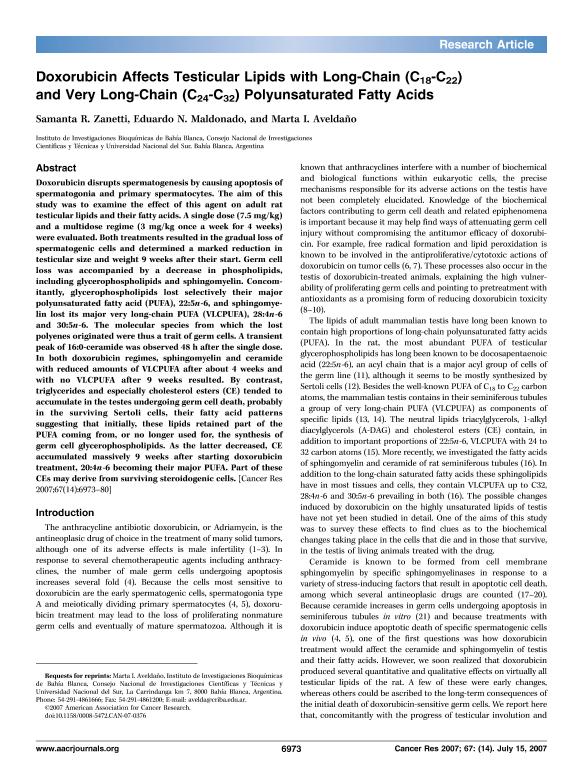Artículo
Doxorubicin Affects Testicular Lipids with Long-Chain (C18-C22) and Very Long-Chain (C24-C32) Polyunsaturated Fatty Acids
Fecha de publicación:
07/2007
Editorial:
American Association for Cancer Research
Revista:
Cancer Research
ISSN:
0008-5472
Idioma:
Inglés
Tipo de recurso:
Artículo publicado
Clasificación temática:
Resumen
Doxorubicin disrupts spermatogenesis by causing apoptosis of spermatogonia and primary spermatocytes. The aim of this study was to examine the effect of this agent on adult rat testicular lipids and their fatty acids. A single dose (7.5 mg/kg) and a multidose regime (3 mg/kg once a week for 4 weeks) were evaluated. Both treatments resulted in the gradual loss of spermatogenic cells and determined a marked reduction in testicular size and weight 9 weeks after their start. Germ cell loss was accompanied by a decrease in phospholipids, including glycerophospholipids and sphingomyelin. Concomitantly, glycerophospholipids lost selectively their major polyunsaturated fatty acid (PUFA), 22:5n-6, and sphingomyelin lost its major very long-chain PUFA (VLCPUFA), 28:4n-6 and 30:5n-6. The molecular species from which the lost polyenes originated were thus a trait of germ cells. A transient peak of 16:0-ceramide was observed 48 h after the single dose. In both doxorubicin regimes, sphingomyelin and ceramide with reduced amounts of VLCPUFA after about 4 weeks and with no VLCPUFA after 9 weeks resulted. By contrast, triglycerides and especially cholesterol esters (CE) tended to accumulate in the testes undergoing germ cell death, probably in the surviving Sertoli cells, their fatty acid patterns suggesting that initially, these lipids retained part of the PUFA coming from, or no longer used for, the synthesis of germ cell glycerophospholipids. As the latter decreased, CE accumulated massively 9 weeks after starting doxorubicin treatment, 20:4n-6 becoming their major PUFA. Part of these CEs may derive from surviving steroidogenic cells.
Palabras clave:
Antineoplasic Drugs
,
Spermatogonia
,
Apoptosis
,
Testicular Lipids
Archivos asociados
Licencia
Identificadores
Colecciones
Articulos(IMEX)
Articulos de INST.DE MEDICINA EXPERIMENTAL
Articulos de INST.DE MEDICINA EXPERIMENTAL
Articulos(INIBIBB)
Articulos de INST.DE INVEST.BIOQUIMICAS BAHIA BLANCA (I)
Articulos de INST.DE INVEST.BIOQUIMICAS BAHIA BLANCA (I)
Citación
Zanetti, Samanta Romina; Maldonado, Eduardo N.; Aveldaño, Marta Isabel; Doxorubicin Affects Testicular Lipids with Long-Chain (C18-C22) and Very Long-Chain (C24-C32) Polyunsaturated Fatty Acids; American Association for Cancer Research; Cancer Research; 67; 14; 7-2007; 6973-6980
Compartir
Altmétricas




